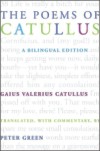|
Books
Poetry
The Last Time I Saw Amelia Earhart
Gabriella Calvorcoressi
Persea Books; April 2005
 Similar in theme and tone to Kettle Bottom by Diane Gilliam Fisher, these poems often focus on characters from small, neglected, blue-colour townsthink miners, factory workers, embittered housewives, and children who grow up way too fast. The bulk of the collection comprises several multi-part poems. Sprinkled among the multi-part poems are several stand-alones, including two prose poems and one ghazal, which, interestingly, ignores the convention of including a rhyme just before the repeated end word(s) of each couplet. Couplets or triplets are the architectural staple throughout, but Calvorcoressi occasionally diverges into more open forms. Her line breaks, in particular, are remarkably well planned, and she uses internal rhyme sparingly but to excellent effect. A beautifully harrowing collection, highly recommendedparticularly for all who like their poetry a bit on the dark side. Similar in theme and tone to Kettle Bottom by Diane Gilliam Fisher, these poems often focus on characters from small, neglected, blue-colour townsthink miners, factory workers, embittered housewives, and children who grow up way too fast. The bulk of the collection comprises several multi-part poems. Sprinkled among the multi-part poems are several stand-alones, including two prose poems and one ghazal, which, interestingly, ignores the convention of including a rhyme just before the repeated end word(s) of each couplet. Couplets or triplets are the architectural staple throughout, but Calvorcoressi occasionally diverges into more open forms. Her line breaks, in particular, are remarkably well planned, and she uses internal rhyme sparingly but to excellent effect. A beautifully harrowing collection, highly recommendedparticularly for all who like their poetry a bit on the dark side.
The Georgics of Virgil
David Ferry (editor)
 Farrar, Straus and Giroux; May 2005 Farrar, Straus and Giroux; May 2005
Newly translated by the poet and translator David Ferry, The Georgics is one of the great songs, maybe the greatest we have, of human accomplishment in difficult and beautiful circumstances, and in the context of all we share in nature. The Georgics celebrates crops, trees, and animals and, above all, the human beings who care for them. It takes the form of teaching about this care: the tilling of fields, the tending of vines, the raising of cattle and bees. There's joy in the detail of Virgil's descriptions of work well done, and ecstatic joy in his praise of the very life of things, and passionate commiseration too, because of the vulnerability of men and all other creatures to what they have to contend with: storms, and plagues, and wars, and all mischance.
The Poems of Catullus
Peter Green (editor)
University of California Press; September 2005
 Catullus, who lived during some of the most interesting and tumultuous years of the late Roman Republic, spent his short but intense life (84-54 B.C.) in high Roman society, rubbing shoulders with various cultural and political luminaries including Cesar, Cicero, and Pompey, Catullus's poetry is by turns ribald, lyric, romantic, satirical; sometimes obscene and always intelligent, it offers us vivid pictures of the poet's friends, enemies and lovers. This new bilingual translation of Catullus's surviving poems by Peter Green adheres to the principle that the rhythm of a poem, whether familiar or not, is among the most crucial elements for its full appreciation. Green has therefore translated all the poems into stress equivalents of the original meters, and each poem appears opposite its Latin original. He also provides an essay on the poet's life and literary background, a historical sketch of the politically fraught late Roman Republic in which Catullus lived, copious notes on the poems, a wide-ranging bibliography for further reading and a full glossary. This edition is thus designed to bring the great pleasures of these poems to as wide an audience as possible. Catullus, who lived during some of the most interesting and tumultuous years of the late Roman Republic, spent his short but intense life (84-54 B.C.) in high Roman society, rubbing shoulders with various cultural and political luminaries including Cesar, Cicero, and Pompey, Catullus's poetry is by turns ribald, lyric, romantic, satirical; sometimes obscene and always intelligent, it offers us vivid pictures of the poet's friends, enemies and lovers. This new bilingual translation of Catullus's surviving poems by Peter Green adheres to the principle that the rhythm of a poem, whether familiar or not, is among the most crucial elements for its full appreciation. Green has therefore translated all the poems into stress equivalents of the original meters, and each poem appears opposite its Latin original. He also provides an essay on the poet's life and literary background, a historical sketch of the politically fraught late Roman Republic in which Catullus lived, copious notes on the poems, a wide-ranging bibliography for further reading and a full glossary. This edition is thus designed to bring the great pleasures of these poems to as wide an audience as possible.
Compiled by: Sanyat Sattar
Copyright
(R) thedailystar.net 2005
|
